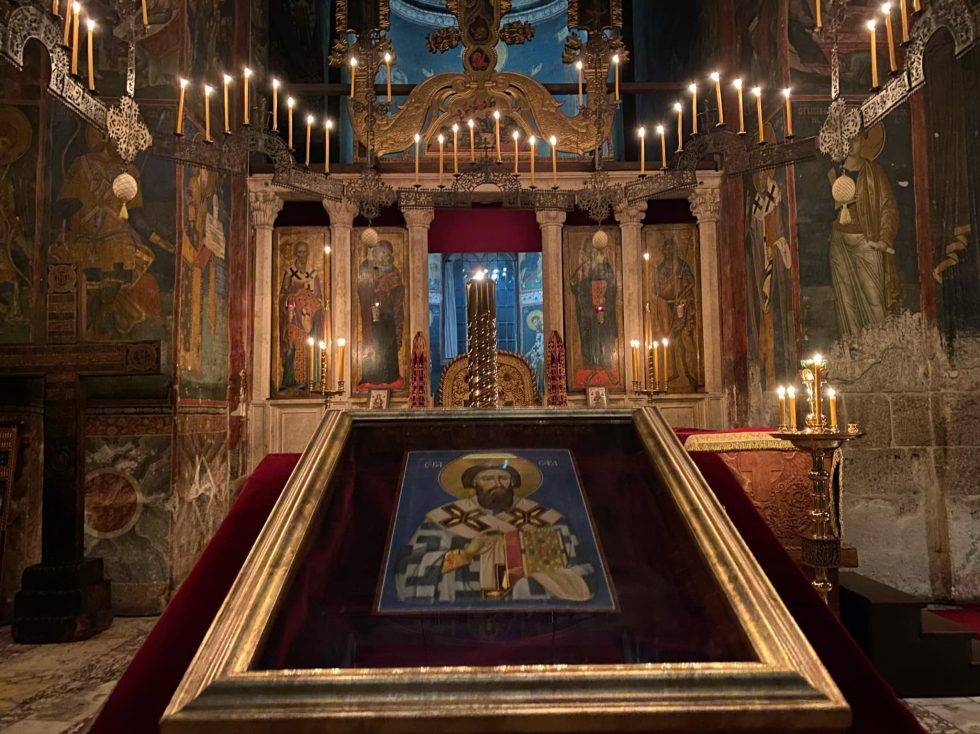
The Sermon of Saint Sava on the True Faith in 1220
Brothers and companions and fathers and children of God, incline your God-loving hearts to hear the divine commandments. And having heard these holy words, lay them, therefore, brothers, in your hearts and on the conscience of your souls and before the eyes of your mind, and understand.
The most merciful and loving God, having immeasurable mercy towards the human race, bowed the heavens and came down to earth and, by His divine providence and the voluntary endurance of the manifold sufferings of the divine body, enlightened our race and sent the holy Apostles into the whole world, saying to them:
“Go and teach all nations, baptizing them in the name of the Father and of the Son and of the Holy Spirit” (Mt 28:19). But since they themselves did not come to us, our fathers, having heard their words in truth, believed them. The most good God, who has infinite mercy and does not want any of us to perish (I Tim 2:4), and according to that same first commandment and in the same way according to the teaching and preaching of the holy apostles, raised me to this sainthood, wanting through me to “fill up the shortcomings of our fathers.” (Col 1:24). And he commanded me by his Holy Spirit to proclaim to you his word of your salvation, which, having heard it with love, you should keep, so that we too may become partakers of the order of the saints.
And this I beseech you, therefore, brethren and children, having placed all our hope in God, first of all to hold fast to His true faith. For “no other foundation,” as the apostle says, “can any man lay, but that which is laid” (I Cor 3:11) by the Holy Spirit through the holy apostles and the God-bearing fathers, and that is the true faith, which was confirmed and preached in the holy seven ecumenical councils. After this, on this foundation of holy faith, it is fitting for us to build gold and silver and precious stones (cf. I Cor 3:12), i.e. good works. For neither is the correctness of life profitable without true faith in God and enlightenment, nor can true confession without good works present us to the Lord, but we need to have both, so that “the man of God may be perfect” (II Tim 3:17), and not that our life be crippled by its deficiency. For “faith is saving,” as the apostle said, “which works through love” (Gal 5:6).
We believe, therefore, in the Father and the Son and the Holy Spirit, praising the divine Trinity, the cause and creator of all that is caused and created, visible and invisible, who is therefore of one essence, that is, nature, in three persons, that is, composition and person, by which we do not mean by form or difference in three Gods or three natures or three essences, we strive to understand, but (we confess) one God and his one simple and incorporeal nature and essence, and by the difference of person we signify the difference of Hypostasis; worshiping the Trinity in Unity and Unity in Trinity, the Unity of the Trihypostatic and the Trinity of One Essence and One Power and Self-Begotten. This one alone we know, which is always, without beginning, uncreated, immortal, incorruptible, passionless, which creates and sustains and contemplates all things.
And one of the Trinity, not the Father nor the Holy Spirit, but the Son begotten of God the Father, and God, the Logos, born of Him in time and inseparably, and not created, consubstantial with the Father and always existing with Him; who by his goodness brought all things out of non-being into being, and who in the last days for our salvation came down from heaven and dwelt in the womb of the Virgin and was united with the body enraptured, a rational and intelligent soul by essence from that holy and pure Theotokos Mary.
He, from God the Father Consubstantial with Him God the Logos, who for the sake of great love for mankind chose, by the will of the Father and the Spirit, to save His creation; from the bosom of the Father, from whence He did not depart, He descended and entered the womb of the Most Pure Virgin, taking upon Himself a body not previously taken, spiritualized with a rational and intelligent soul, receiving what was not previously received, God came forth incarnate, being born ineffably and preserving unharmed the virginity of Her who gave birth; not suffering any fusion or change, but remaining what He was and becoming what He was not; taking the form of a servant (Philippians 2:7) truly and not in an illusion, in everything except sin He was made like us. (Cf. Hebrews 4:15; 2:17).
We know Him as perfect God and perfect Man, not two and two, but one and the same both before and after the incarnation, one composite being, Him one and the same in two perfect natures and properties and in two natural wills, and in the actions of both united in their composition unchangeably: we confess Him one and the same willing and doing divine things as God, and Him one and the same willing and doing human things as man. For He was not subject to natural needs, but was born of His own will, hungered of His own will, thirsted of His own will, labored of His own will, feared of His own will, died of His own will, truly and not seemingly, suffered all natural and genuine human sufferings.
He, sinless, was crucified and tasted death, and on the third day He rose again in His body, not seeing corruption (according to Acts 2:17), and His human nature, unharmed and without death, was raised again, and having taken it up into heaven, He sits at the right hand of the Father; and He will come again to judge the living and the dead; and as He ascended in His body, so when He comes, He will give to each one according to his deeds. For He said: “The dead will rise again, and those in the graves will rise; those who have done good” with true faith, “will come out to eternal life, and those who have done evil to the resurrection of judgment.” (John 5:25, 28-29; cf. I Cor 15:52).
To this end, we bow down and kiss the venerable icon, the human incarnation of the Logos, anointed with divinity, and which has remained unchanged, so that he who is anointed by faith thinks that he sees God Himself who appeared in the flesh and dwelt among men (cf. II Tim 3:16; Baruch 3:38). We also bow down to the wood of the Precious Cross and to the holy and honorable vessels and to the divine churches and holy places. We also bow down to the venerable icon of the Most Holy Theotokos and to the icons of the venerable saints of God, raising the eyes of the soul to the original image and raising the mind to what is incomprehensible. These, lovers of God, are the commandments of the orthodox patristic traditions. Following these, we also believe and confess, and we curse all heretics and every heresy of theirs. We receive the holy seven Ecumenical Councils, (the first) which was in Nicaea 318 holy Fathers; (the second) in the city of Constantine 164 holy Fathers; the third, earlier in Ephesus 200 holy Fathers, the fourth in Chalcedon, 630 holy Fathers, the fifth in the city of Constantine 164 holy Fathers, the sixth again in the city of Constantine 170 holy Fathers. And yet another, which was a little later in the metropolis of Nicaea, the seventh council of 350 holy Fathers, who renounce the venerable icons and do not paint them or worship them, impiously slandering Christians.
And we also receive all the holy Councils which, by the grace of God, at various times or in various places gathered for the sake of piety and the evangelical life, which the Conciliar Church receives. And those whom these holy Fathers renounced, we also renounce; and those which the holy fathers renounced, we also renounce; those which they cursed, we also curse.
For the devil has invented many heresies in different times and years, and through those who serve him, the lawless leaders of heresy, he has sown many tares of evil faith in the world for the purpose of destroying and confusing the true faith, whom we curse, and with them those who invented evil dogmas, and we abhor every impious heresy.
But, moreover, we hasten to every piety, which is taught to us by the God-wise servants of God: the prophets, apostles and saints, as our Lord Jesus Christ, the Son of God, himself said, when he came from the Father to earth and was incarnate and born a second time, from the ever-pure Virgin, and fulfilled the dogmas of the Father's and His own economy wonderfully, and truly ineffably crucified on the cross, and on the third day rose again, and remained here on earth for forty days after His resurrection. And when he was about to ascend to heaven to the Father, he commanded his disciples, the apostles, saying: “Go and make disciples of all nations, baptizing them in the name of the Father and of the Son and of the Holy Spirit, teaching them to observe all that I have commanded you” (Mt 28:19). And again: “Preach the Gospel to every creature; whoever believes and is baptized will be saved; "But he who does not believe will be condemned" (Mark 16:15). This, then, is the true faith of God, to be baptized in the name of the Father and of the Son and of the Holy Spirit.
And so we, who are Christians, have promised to pray to our God, always keeping His commandments, and always doing His will. For “faith without works is dead,” according to the word of James (James 2:20, 26). But, my beloved brothers and children, as I said before, let us hold both with fear and trembling. Hold the word of God and His holy faith, and call on His three-holy name with a pure heart, and do not be lazy in holy prayers, cling to Him, confessing your sins, weeping with tears before Him, and singing and praising Him in your hearts unceasingly, day and night, without weakening. For God, when we confess to Him and pray to Him, Himself convinces people and spiritually enters the hearts of those who listen well to the teaching about God.
For spiritual learning is not a game, nor the folly of human thoughts, but the preached holy faith of God, upon which all the holy rites are founded in Christ Jesus our Lord, about whom the prophets prophesied by the Holy Spirit of God, and all the saints preserved, and the venerable fathers without blemish maintained without blemish, as on an indivisible cornerstone, the church stone, Christ, who is the Wisdom of the Father and power, holy spiritually and powerfully and firmly and firmly and confidently in faith, who even to this day convinces many and establishes and confirms to all his divine faith. And to us the all-good lover of mankind reaches out with his rich grace, correcting our shortcomings, desiring as a true shepherd to gather us, lost sheep, into the heavenly fold. Seeing this with the eyes of thought and soul, we always pray to Him, as He Himself grants us to utter it or to think it, and to preserve the ineffable. And we, having done His will, will receive salvation from Him in this age and in the age to come, if we faithfully keep His commandments, which God Himself commanded us to keep, and He promised us a heavenly reward for this, saying: “Truly, I say to you, whoever keeps My word will never taste death” (John 8:51). Yes, my beloved children, what is more reliable or more just than this word, which Christ Himself testifies to and establishes with truth? What is better than this: not to taste death forever? For this very not to taste death is already far from sin; for through the tasting of sin the taste of death entered the human race, until Christ (cf. Rom. 5:12). For this reason He tasted death, who is sinless and immortal by the first birth from the Father; but for our sake he tasted it, and suffered, that we also might taste immortality by faith in Him, as the prophet said: “Taste and see that the Lord is good” (Ps 34:8). He is therefore very good and just and faithful in all his words (cf. Ps 145:9), and all his works are in faith. Therefore, my God-loving children, we who love Him should do works of faith in Christ Jesus our Lord, we who have received immortal faith from Him, such a gift – that we should not die forever!
Therefore, if you keep this, you will be blessed by God forever and your hearts will be blessed, and your souls will be blessed, and you who have received the faith of God and have kept yourselves pure in it. Looking at the immortal gift of Christ, always do immortal works in Christ: pure faith and frequent prayer, with love having hope in Him, and a clear conscience before God and men (cf. DA 24:16), fasting and vigilance, truthfulness in all things, bodily purity and spiritual abstinence, preserving the mind of holy baptism, the enlightenment of God, by which we renounce Satan and all his works. And always love repentance, confession of our sins and weeping over them and humility, righteousness, instruction, correction of our lives, hatred of sin; not drunkenness, not fornication, but, on the contrary, a pure life, such as is pleasing to the eyes of God.
For God is one from the beginning and for endless ages. And this is the first commandment spoken to those who love Him: that each of you “love the Lord your God with all your heart, with all your mind, with all your soul, and with all your strength” (Deuteronomy 6:4-5; Mark 12:29-30; Matthew 22:37-38). And let these words, which (Deuteronomy 6:6) I command you today, be written on your hearts and in your souls, that you fear the Lord God Almighty, and Him alone you shall serve with fear and trembling (cf. Deuteronomy 6:6, 13; 10:20; Ps 2:11), and to Him alone you shall ascribe honor and glory, and to Him alone you shall cleave, and you shall not swear by His name, but let your word be: He who is, that he is, and he who is not, that he is not (cf. James 5:12; Matthew 5:37).
And so that in no way is there any other God mentioned among you, except the One who created heaven and earth; you shall not worship or serve anything “in heaven above or on earth beneath or in the water under the earth” (Exodus 20:4-5), except the Lord your God, in whom you were baptized and believed, and renounced the secret shame (cf. II Cor. 4:2), and became partakers of His good faith and partakers of His immortality. To Him alone do you hold fast, for “all things are laid bare before His eyes,” as the Apostle says (Hebrews 4:13), and “for our God is a consuming fire” (Hebrews 12:29); and “returning the iniquity of the fathers upon the children unto the third and fourth generation of them that love him not, and that do not do his will, and shewing mercy unto thousands and ten thousands of them that love him and keep his commandments” (Exodus 20:5-6). For he is “God of gods, and Lord of lords, the great, mighty, and awesome God” (Deuteronomy 10:17). That ye “keep his commandments, and do before him all the words which I have commanded you,” “that it may go well with you, and with your children after you, and that ye may live for ever, if ye do that which is good and pleasing in the sight of the Lord your God” (cf. Deuteronomy 6:2; 10:13; 5:29; 13:18). To whom be glory from beginning to end, amen.
Source: Žiča Monastery
PHOTOS
RELATED ARTICLES
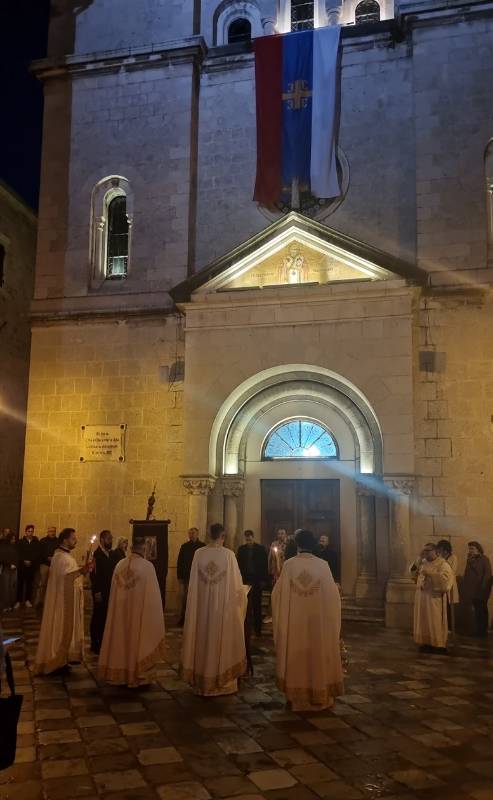
EASTER IN KOTOR WITH MATS AND HOLY LITURGY
With matins and a procession around the churches of St. Nicholas and St. Luke,...
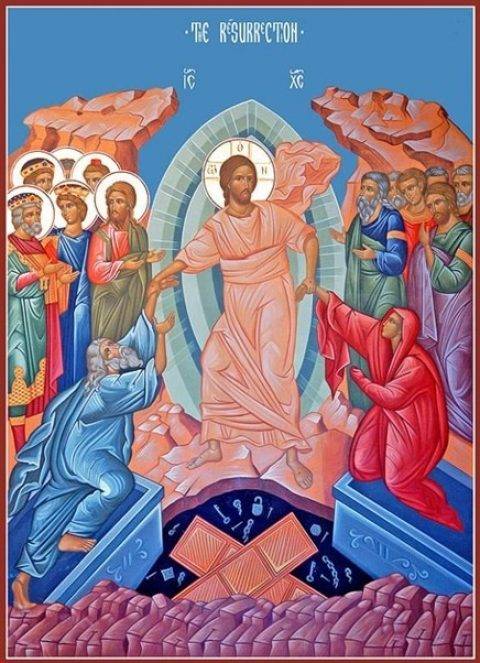
Calendar for April 20 The Resurrection of the Lord Jesus Christ – Easter
“Now after the Sabbath, as it began to dawn toward the first day of the...
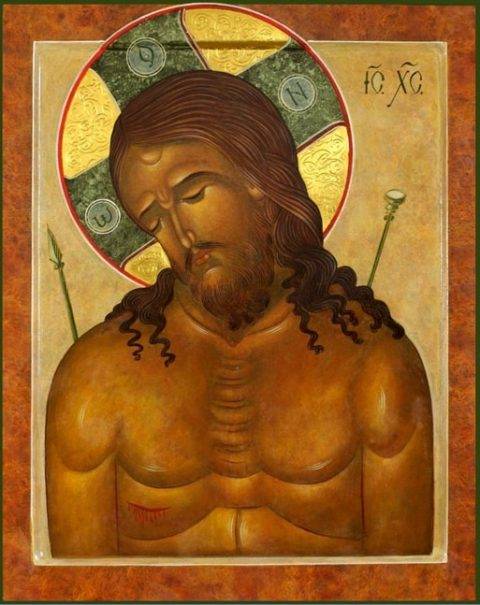
Calendar for April 19 Maundy Saturday
On the Saturday after the crucifixion, the chief priests and Pharisees came to...


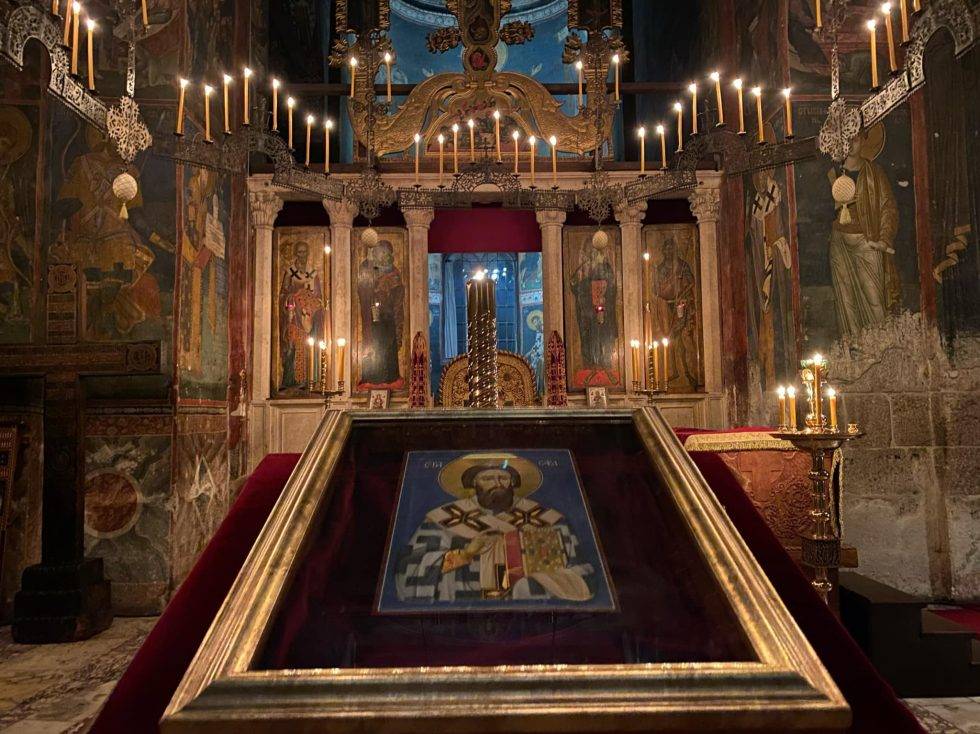

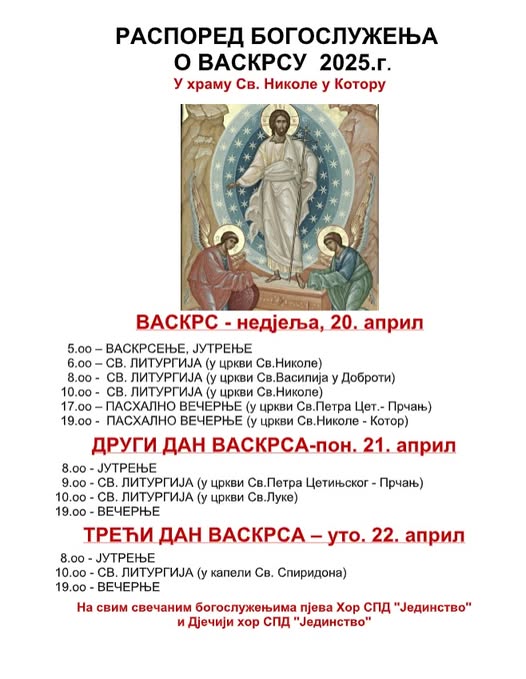
.png)